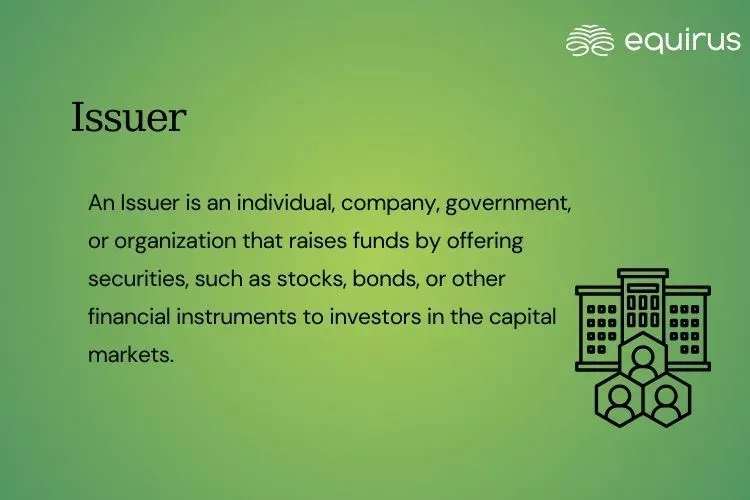Issuer

Key Highlights
-
An Issuer is an individual, company, government, or organization that raises funds by offering securities, such as stocks, bonds, or other financial instruments to investors in the capital markets.
-
*Type of Issuer includes corporations, governments, municipalities, financial institutions and special purpose vehicles (SPVs).
What is Issuer?
An Issuer is an individual, company, government, or organization that raises funds by offering securities, such as stocks, bonds, or other financial instruments to investors in the capital markets.
The issuer is the party that creates and sells the security, and is responsible for providing returns to investors as per the terms of the security.
Types of Issuers
| Type of Issuer | Description |
|---|---|
| Corporations | Issue stocks or bonds to raise capital for expansion, operations, or debt repayment |
| Governments | Issue bonds (e.g., Treasury Bonds, G-Secs) to finance public spending or infrastructure |
| Municipalities | Issue municipal bonds for funding local projects like schools or roads |
| Financial Institutions | Issue certificates of deposit (CDs), bonds, or structured products |
| Special Purpose Vehicles (SPVs) | Used in structured finance or securitization to issue asset-backed securities |
Common Securities Issued
-
Equity Shares: Ownership in a company
-
Debt Instruments: Bonds, debentures, commercial paper
-
Preferred Shares: Hybrid of debt and equity with fixed dividends
-
Structured Products: Custom investment instruments with embedded derivatives
Responsibilities of an Issuer
1. Disclosure & Compliance: Must disclose all material information to investors (as per SEBI, SEC, etc.)
2. Servicing Debt: In case of bonds or debentures, issuers must make regular interest payments and repay principal.
3. Corporate Governance: Public companies issuing equity must follow high standards of governance and reporting.
4. Creditworthiness: Especially for debt issuers, credit rating is important to attract investors.
Example
If a company like Infosys issues bonds to raise ₹500 crore, Infosys is the issuer, and the bondholders (banks, mutual funds, or individuals) are the investors. Infosys must pay interest to the bondholders and return the principal on maturity.
In the Indian Context
In India, issuers are regulated by SEBI (Securities and Exchange Board of India). Any company issuing securities to the public must file a prospectus, comply with listing regulations, and meet disclosure standards.
